| Article ID | Journal | Published Year | Pages | File Type |
|---|---|---|---|---|
| 604404 | Food Hydrocolloids | 2015 | 10 Pages |
•Microparticulated (MP) whey proteins enhance the heat stability of emulsions.•MP-WPC allows the addition of much higher protein concentrations to emulsions.•MP-WPC provides no visible gelation or aggregation, even at higher ionic strength.•The amount of undenatured protein in the serum phase is key for this heat stability.
There is a desire to incorporate increasingly high concentrations of whey proteins into nutritional beverages to improve their nutritional content and amino acid profile. However, typical thermal treatments for sterility or extended shelf life cause undesirable aggregation/gelation of the whey proteins. To address this instability issue at high protein concentration, there is a need to develop new protein ingredient technologies that can provide resistance to heat-induced aggregation. In this study, the heat stability characteristics of model food emulsions containing standard or microparticulated whey protein concentrate (WPC80) were compared. Oil-in-water emulsions [10% (wt/wt) sunflower oil] containing increasing concentrations of protein (from 2 to 12 wt%) were prepared at pH 7.0. The effects of retorting at 120 °C for 10 min on particle size distribution, rheological properties, susceptibility to heat-induced coagulation, microstructure and surface protein concentration of the standard and microparticulated WPCs were compared. Also, various levels of NaCl were added to examine the heat stability of micro-aggregated WPC in the presence of additional salts.Microparticulated WPC emulsions showed significantly enhanced heat stability compared with standard WPC emulsions. Emulsions with up to 11 wt% protein and no visible aggregation or gelation after retorting were produced using microparticulated WPC. For standard WPC emulsions under the same heating conditions, large aggregates were formed and there was a change in flow behaviour to non-Newtonian at 3 wt% protein. With this specific technology, high protein whey-based nutritional beverages can be produced using conventional thermal treatments.
Graphical abstractFigure optionsDownload full-size imageDownload as PowerPoint slide
